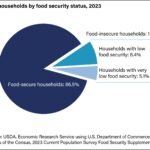While it might seem convenient in a pinch, feeding your rabbit cat food can be detrimental to their health. Rabbits have very specific dietary needs, and cat food simply doesn’t meet those requirements. This article will delve into the reasons why cat food is unsuitable for rabbits, outlining the potential health risks and providing guidelines for a proper rabbit diet.
Rabbits are herbivores, meaning their digestive systems are designed to process plant-based foods. Their diet should primarily consist of hay, fresh vegetables, and a limited amount of high-quality rabbit pellets. Cat food, on the other hand, is formulated for obligate carnivores and contains high levels of protein and fat, which can severely disrupt a rabbit’s delicate digestive system.
Why Cat Food is Harmful to Rabbits
There are several reasons why cat food is not a suitable food source for rabbits:
-
High Protein Content: Cat food is very high in protein, which can cause kidney damage and other health problems in rabbits. A rabbit’s digestive system isn’t designed to process such high levels of protein.
-
High Fat Content: The high fat content in cat food can lead to obesity, liver problems, and other health complications in rabbits. Rabbits require a low-fat diet to maintain optimal health.
-
Lack of Fiber: Fiber is essential for a rabbit’s digestive health. Cat food lacks the necessary fiber content to keep a rabbit’s digestive system functioning properly. This can lead to gastrointestinal stasis, a potentially life-threatening condition.
-
Inadequate Nutrients: Cat food doesn’t contain the right balance of vitamins and minerals that rabbits need to thrive. Rabbits require specific nutrients, such as calcium and vitamin D, in different ratios than cats.
Alt text: A happy rabbit munching on a generous pile of fresh Timothy hay, the cornerstone of a healthy rabbit diet.
Potential Health Risks of Feeding Rabbits Cat Food
Consuming cat food, even in small amounts, can lead to a variety of health issues in rabbits, including:
-
Gastrointestinal Stasis (GI Stasis): This is a potentially fatal condition where the digestive system slows down or stops completely. The lack of fiber in cat food contributes to this risk.
-
Obesity: The high fat content in cat food can quickly lead to weight gain and obesity, putting a strain on the rabbit’s joints and organs.
-
Kidney Damage: High protein levels can damage the kidneys over time, leading to kidney disease.
-
Liver Problems: The excess fat can also contribute to liver problems, such as hepatic lipidosis (fatty liver disease).
-
Bladder Sludge and Stones: An imbalanced diet can lead to the formation of bladder sludge and stones, causing pain and difficulty urinating.
Alt text: A close-up of a content rabbit enjoying a variety of fresh, leafy green vegetables, showcasing the vibrancy and health benefits of a plant-based diet.
What Should Rabbits Eat? A Proper Rabbit Diet
A healthy rabbit diet should consist of the following:
-
Hay (80-90% of diet): Timothy hay, orchard grass, or other grass hays should make up the majority of a rabbit’s diet. Hay provides essential fiber for digestion and helps wear down their teeth.
-
Fresh Vegetables (10-15% of diet): Offer a variety of leafy green vegetables such as romaine lettuce, kale, parsley, and cilantro. Avoid iceberg lettuce and starchy vegetables like potatoes.
-
Rabbit Pellets (5% of diet): Choose high-quality rabbit pellets that are specifically formulated for rabbits. Limit the amount to prevent overfeeding and obesity.
-
Fresh Water: Always provide fresh, clean water in a bowl or water bottle.
Alt text: An infographic depicting the ideal rabbit food pyramid, emphasizing hay as the foundation, followed by fresh vegetables and a small portion of pellets for a balanced diet.
What to Do If Your Rabbit Ate Cat Food
If your rabbit accidentally ate a small amount of cat food, don’t panic. Monitor them closely for any signs of digestive upset, such as decreased appetite, diarrhea, or lethargy. If you notice any of these symptoms, contact your veterinarian immediately.
Avoid giving your rabbit cat food in the future. Store cat food in a secure location where your rabbit cannot access it. Educate other members of your household about the dangers of feeding rabbits cat food.
Conclusion
While the occasional nibble of cat food might not cause immediate harm, it’s crucial to understand that cat food is not a suitable substitute for a proper rabbit diet. The high protein and fat content, coupled with the lack of fiber, can lead to serious health problems. Always prioritize a diet rich in hay, fresh vegetables, and a limited amount of rabbit pellets to ensure your rabbit’s long-term health and well-being. When in doubt, consult with your veterinarian for personalized dietary recommendations.

